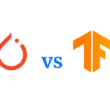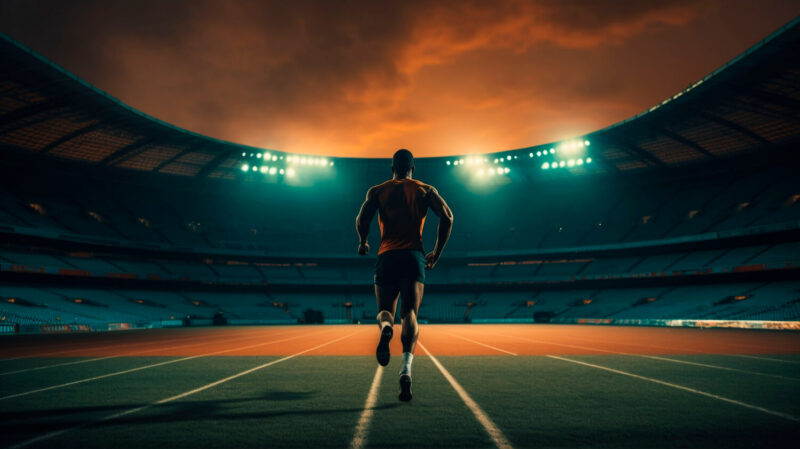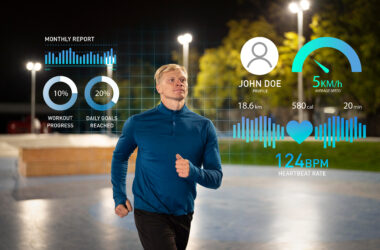In 2024, the world of sports witnessed an unprecedented digital transformation driven by AI in sports and data visualization (DV).
Now, Baseball teams are inclined to use AI systems to analyze swing mechanics, pitch selection, and defensive positioning for individual players. In Basketball, too, players are gaining an advantage over their opponents using AI software that analyzes game footage, providing real-time insights to coaches and players. This technological advancement changed how teams strategize and elevate sports events’ overall performance and entertainment value.
Traditionally, performance analysis in sports relied on subjective observations, standard statistical models, and manual data collection. While effective, these methods had their limitations in terms of time and subjectivity. However, AI solutions in sports opened a new way of athletic training and real-time performance analysis.
It reorganizes how sporting events are broadcast using automated video highlights and personalized content delivery. AI easily catches the game highlights that matter to fans. By doing this, it has taken fan engagement to new heights.
This blog focuses on how AI in sports is being fully utilized, mostly for Performance analysis and athletic trainings, and what the future holds for athletes, coaches, and sports fans.
What Is AI in Sports Analytics?
AI combines artificial intelligence and machine learning in sports to gather data during sports events. This data comprises a wide range of information regarding player statistics, game dynamics, and external factors like weather.
AI uses algorithms to extract valuable insights from massive amounts of data that wouldn’t be possible through traditional analysis methods. It helps coaches, athletes, analysts, and fans understand the game better and make informed decisions.
These methods give insights into each player’s sports performance. It reveals patterns that help coaches identify strengths and weaknesses in their team.
AI comprehends the tendencies of opponents and generates performance data for teams. In order to suggest optimal game plans and in-game adjustments to enhance the chances of success. Hence, artificial intelligence is indeed an important factor in sports performance analysis.
Why Is There a Need for AI in Sports Performance Analysis?
In sports, scores and dedication of the team matter to their fans, and coaches are always looking for ways to improve sports performance analysis. However, traditional data collection and analysis methods can be time-consuming and subjective.
Therefore, algorithms that track and measure sports outcomes are used to examine vast amounts of data gathered from video footage, wearables, and sensors. It eliminates human bias and provides objective insights into player performance. This enables coaches to make data-driven decisions for their teams.
Moreover, with athletic training AI, it becomes easy to identify potential injuries of players and prevent them from happening. It records athlete’s health data and movement patterns. Not only that, it can detect any abnormalities to alert the medical team before a serious injury occurs.
The integration of AI in sports performance analysis addresses fundamental needs in the field. Eventually, it leads to a revolution in how athletes train and compete. To understand it better, here are the top 6 reasons why AI has become indispensable in sports and athletic training:
1. Going Beyond Human Limits
Sports coaches are professional and have experience so they can handle their teams. However, there are certain areas where even coaches are lacking. AI lends them a hand in crunching massive datasets, identifying trends, and drawing insights.
2. Individualized Potential
Each athlete is unique; traditional analysis often falls short of personalized solutions. AI analyzes individual data points, strengths, weaknesses, and training responses. It then designs tailored programs that unlock each athlete’s full potential.
3. Anticipating the Unexpected
High ability skill and observation are required to anticipate opponents for the game’s success. To understand opponent gameplay footage and historical data, we apply AI techniques. It predicts player tendencies and potential formations, giving teams a valuable edge.
4. Proactive Injury Prevention
Injuries can derail careers and championships. It is a concern to monitor training loads, biomechanics, and fatigue levels. AI in sports prevents potential injuries before they occur and allows faster recovery.
5. Optimizing Tactics
Making crucial decisions based on intuition alone carries risks. Complex data sets, including financial information and player performance, hold profound importance in sports. Hence, AI recommends optimal game plans, resource allocation strategies, and even scouting insights for smarter recruitment.
6. Leveling the Playing Field
One of the most exciting aspects of AI in sports performance analysis is its potential to level the playing field. With the help of advanced algorithms and sports data analysis, smaller teams or underdog players can now compete with larger, well-funded teams on a more equal footing.
This creates a fairer and more competitive environment for all involved in sports, making it not just about financial resources.
AI Applications in Sports and Athletic Training
Coaches and strategists have long relied on their experience and intuition to develop game plans. However, performance enhancement AI has added a new dimension to this process.
We have strategies to assess opponent behavior and sports patterns. It suggests that coaches make data-driven decisions during games, increasing the chances of victory.
AI is the simulation of human intelligence that uses machines programmed to think and observe like humans. This data encompasses player statistics and game dynamics, among other things.
Now, team players have wearable devices to monitor heart rate, body temperature, speed, and other vital stats during training or competition. It gives real-time feedback so athletes can adjust their performance on the go. Here are some applications of AI in sports that are changing the game:
1.Performance Analysis
Imagine athletes receiving tailor-made training programs designed specifically for their strengths, weaknesses, and training data. AI designs personalized plans that optimize performance and unlock potential. It ensures that each athlete receives the training they need for the game’s success.
2. Injury Prevention
Predicting injury risk was impossible with traditional analysis of sports. It has become possible with AI. It observes if the player is at risk before injuries occur. And create rehabilitation programs for faster and more efficient recovery, getting athletes back in the game sooner.
3. Game Strategy
Gaining a competitive edge is easier as we have vast amounts of opponent data, where it is easy to recognize strengths, weaknesses, and tendencies. That allows teams to develop game plans to exploit their opponent’s vulnerabilities.
4. Fan Engagement
Imagine fans receiving preferred insights into the game, from player statistics and performance trends to outcome predictions. This information, delivered through AI, can make the game more engaging and enjoyable, drawing fans deeper into the action.
5. Fair Play
Ensuring fair and accurate calls becomes more achievable with AI assisting referees. Instant replays and relevant data provided help in reviewing close calls. That minimizes human error and upholds fair play.
6. Talent Scouting and Recruitment
AI is transforming the art of finding promising new talent and making strategic recruitment decisions. With access to extensive data on athletes from all over the world, AI algorithms can identify patterns and predict future performance levels.
AI-Powered Coaching: Taking Sports Training to Next Level
With the integration of AI in sports, coaches can access insights that would be impossible to obtain otherwise. They can use the new sports technology to have better training methods and ensure athlete performance optimization in ways previously thought unachievable.
Here are some of the ways AI is changing sports coaching:
1. Coaches’ Data-Driven Decisions
Coaches now have a wealth of data at their fingertips. It allows them to make more informed decisions about team strategy and individual player development. It enhances performance and helps in the growth of individual athletes.
2. Real-Time Feedback through AI Coaching
Coaches now have a wealth of data at their fingertips. It allows them to make more informed decisions about team strategy and individual player development. It enhances performance and helps in the growth of individual athletes.
3. Personalized Virtual Coaching
AI has the potential to revolutionize sports by providing personalized virtual coaching systems. These systems analyze an athlete’s movements in real time and provide feedback on form, technique, and performance.
4. AI-Driven Athlete Development
Using AI insights, coaches pinpoint improvement areas and tailor training, guiding athletes toward better performance and continual growth, ultimately benefiting players and teams.
5. Enhancing Team Strategy
By tailoring workouts and drills to individual needs, athletes can excel in team strategy. This individualized approach not only boosts confidence but also fosters a culture of continuous improvement within the team.
Conclusion
AI in the sports industry is expected to grow exponentially as the demand for data-driven decision-making and performance analysis continues to rise. It wouldn’t be wrong to say that AI levels the playing field and makes sports more engaging for fans.
Team players can now access extensive training programs to improve their performance and strengths. It also helps in injury prevention and overall player health. Coaches also get to benefit from AI-powered coaching to improve the team performance.
With AI becoming an integral part of the sports world, we can expect to see new and innovative applications of this technology that will continue to transform how we play and watch sports. And if you haven’t already, it’s about time you embraced the power of AI in sports and took your team’s performance to the next level.
Frequently Asked Questions (FAQs)
How Does AI Contribute to Athletic Training?
Athletic training AI provides valuable data insights that help improve performance, prevent injuries, and personalize training programs for athletes.
What Are Some Examples of AI Applications in Sports Performance Analysis?
Some examples of AI applications in sports performance analysis include personalized training programs and game strategy development.
How Can AI-driven Coaching Improve Athlete Performance?
AI-driven coaching provides real-time feedback during training sessions that assist athletes in making adjustments and improving their performance on the spot.
What Types of Sports Data Are Commonly Analyzed Using AI?
AI is frequently used to analyze player statistics, game dynamics, opponent behaviors, and tendencies. It can also incorporate external factors like weather conditions and player health data.
What Are the Core Benefits of Using AI in Sports Analysis?
AI in sports analysis offers many benefits, such as preventing injuries, developing game strategies, enforcing fair play, and engaging fans on a whole new level.

Dawood is a digital marketing pro and AI/ML enthusiast. His blogs on Folio3 AI are a blend of marketing and tech brilliance. Dawood’s knack for making AI engaging for users sets his content apart, offering a unique and insightful take on the dynamic intersection of marketing and cutting-edge technology.










